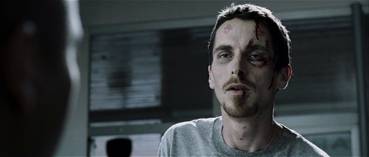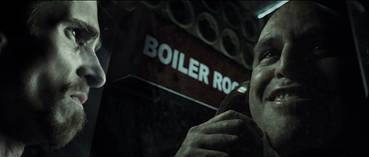|
Trevor
Reznik (Christian Bale) works in a factory. He hasn't
slept for a year. He goes to work by day and shares
the rest of his time with two women, a prostitute (Jennifer
Jason Leigh) and an airport café waitress (Aitana
Sanchez-Gijon). Into this simple, sleepless life, after
a particularly grizzly accident at work, a mysterious
man called Ivan appears.
From
this incredibly simple narrative foundation writer Scott
Koser weaves a complex thread of twists and turns that
makes for a mind-bending ride into the unraveling psyche
of Reznik. The frailty in the mind of Reznik is externalised
by Bale's physical state, it would be impossible to
write anything on this film without commenting on the
staggering weight loss programme Christian Bale embarked
upon for this role (from 183 pounds to just 120), going
above and beyond the call of duty here, and to great
effect.
I'm
a sucker for a well-written piece of plot heavy, conceptual
narrative, and this is very much in that vein. Although,
where some such films lose out on characterisation due
to the driving force of the story, The Machinist sticks like a limpet to Reznik's psyche. This is not
only down to a good script but also good direction in
the hands of Brad Anderson, who's biggest impact in
the industry prior to this film was the hit and miss Session 9. There's something resoundingly
Hitchcockian (and I do not use that term freely!) about
the whole thing. The subjective narrative. The sense
that straight from the off you're plunging into dangerous
waters. There's no safe domain. From the first beautifully
murky-focused shot you are dragged into a dark world
distorted by chronic insomnia. Reznik wonders from one
horrible shock to the next, in terms of plot points
this film is off the chart. The more confused he becomes,
the more the audience are in turn. We share the journey
every step of the way with Reznik and via the fairly
common, yet well used, narrative devise of placing a
scene from near the end of the movie at the beginning,
one is constantly found wondering how he will end up
in that situation, thus heightening the drama, and believe
me it's not easy to predict. But where this is different
from Hitchcock's plots, and most classical narrative,
is that it doesn't start at a point of equilibrium.
It begins at a kind of stable disruption, the man hasn't
slept for a year. Why? It's the slow unraveling (this
is a key theme in the film and will recur in this review)
of this that brings Hitchcock to mind. I get the sense
that Koser had great fun writing the script and laying
his traps, and even though I believe one of the great
strengths of this movie is in the writing I feel many
of these ideas have been borrowed from elsewhere. There
is a good amount of dry comedy included to ease the
strain of an otherwise very dark feature, and Bale executes
it with precision, having had practice of a sort in American Psycho, another piece of twisting
head-fuckery (a lesser used technical term!).

Anyway,
when it comes down to it this film is a three-man show;
writer (Koser), actor (Bale), and its up to the director
(Anderson) to marry the former two and come up with
something special, which in part he has. At first I
thought I was watching a David Fincher movie, the dark,
dingy mise-en-scene and gaunt, dry, protagonist, not
unlike Edward Norton in Fight Club.
Yet when the first scene unraveled (like the piece of
carpet featured in it that holds all the secrets, unraveling
just like Reznik himself), I got that Hitchcock feeling
there might be something a little more special to come.
Then the way Bale slumped and shifted about the frame
like a spectral shell reminded me somewhat of Ralph
Fiennes in the brilliantly understated Cronenberg film, Spider.
(Be mindful of the films I'm listing, I'll come back
to them later.) By this time I was wondering if this
guy had anything of his own to throw in or whether he
suffered from a harsher strain of the same thing as
Mr Koser and the film was to be an amalgam of obvious
influences. In the most part I would have to say that's
what it is, the voice of an auteur did not speak to
me. Yet it is perfectly crafted and beautifully shot.
How much input Anderson had as opposed to Koser in the
placing of key iconography and motifs I do not know,
but their placements are succinct and function well
when the narrative reveal comes to fruition.
Before
I go onto my major misgivings about the film I'd like
to say a little more about Christian Bale's performance.
I am a great fan of Bale's career to date, and his intensely
unfaltering dedication to the medium, in my mind, puts
him up there with Robert DeNiro in his heyday. Obviously
his physical manipulation puts one in mind of DeNiro's
similar challenge for his portrayal of Jake LaMotta
in Raging Bull, although Bale's is
more extreme and he manages to exude a strange kind
of black hole like anti-presence when in frame. Although,
in order for this film to work there needed to be a
beating heart at its centre. Someone the audience could
relate to, identify with and really buy into for the
plot process to work and for viewers to get the impact
of it. There's often something sterile about films with
similar psychological revalationary narratives due to
the concept over-riding the characters, as previously
mentioned. By Bale, almost literally, living and breathing
the character, he prevents this from happening. Every
frame assigned to him he is Reznik therefore we are
Reznik. This is capitalised on by Anderson giving him
a lot of screen time and shrewdly trusting Bale's ability.
Subtle nuances in the writing allows Bale a foot in
the door to create an emotional link with the audience
and the two guiding lights of Leigh's slightly cliched
tart with a heart, Stevie, and Sanchez-Gijon's waitress,
Marie, create a sounding board that secures a humanism
to Reznik without being sentimental. We can see the
man is fragile by his physique and the plot is at one
with his mind, but we can only really see an emotionally
identifiable fragility to him when he is with these
women, providing us with the well-rounded protagonist
that is crucial to the necessary suspension of disbelief.
(Note:
If you have not seen this film it is advisable you skip
to the final paragraph as what follows contains spoilers)
It's
not all positive though. On a plot heavy piece like
this the entire film hinges on an end pay off that must
justify the means to its conclusion and I believe that
the twist the plot is so delicately resting upon has
unfortunately become a common one in recent psychological
thrillers. The films mentioned previously are among
my examples of this as well as the superbly crafted
non-linear masterpiece that is Christopher Nolan's Memento,
a film that contains some of the stronger narrative
elements of The Machinist. I would
say Fight Club pioneered the genre
that Memento went on to explore and The Machinist is yet another take on
the employing of subjective psyche within the diagesis
of the film, in other words Reznik's distorted mental
state (Ivan) is projected into the established reality
of the piece in the same way to Fight Club as personified by Tyler Durden (Koser borrowing narrative
from Fight Club as Anderson has with
it's mise-en-scene), with memory confusion issues signposted
by iconography similar to Memento.
So, with this explored, it is easy to see how I was
disappointed with the end result of the thrilling journey
as it was one I have seen before and done as well if
not a little better.
In
conclusion, despite my qualms and mild disappointment
I think this is a film worth seeing on the strength
of Bale's performance alone and the process of joining
the winding journey through Reznik's world is well worth
arriving at a less than impressive destination.
Framed
at 2.35:1 and anamorphically enhanced, the transfer
on Tartan's disk is a pretty good one, reproducing well
the stripped-down colour and steely blue tint of Reznik's
world and Xavi Giménez's moody but still darkly
naturalistic lighting. Detail is good, sharpness is
impressive (although signs of enhancement are evident
on close inspection) and compression artefacts, though
sometimes present in areas of one colour, are rarely
distracting. A largely sound job.

As
usual with recent Tartan releases, there are three mixes
on offer: Dolby 2.0 stereo, Dolby 5.1 surround and DTS
5.1 surround. This is a fairly subtly mix, with even
the DTS track whispering rather than shouting, and to
nice effect, with the factory noise and score coming
at you from all directions, but never in a disruptive
way. The 2.0 mix is also noteworthy, and front separation
is more noticeable here.
Tartan
have supplemented the solid picture and sound with a handful
of decent extra features.
The Brad Anderson Commentary is
a good one, with the director providing plenty of background
on the making of the film, and on his approach to Scott
Koser's screenplay, which, we are informed, was written
as a spec script when Koser was just out of film school.
Particularly interesting are the problems of shooting
in Barcelona, a situation created by the impossibility
of funding the film in the US, something Anderson sees
as something of a comment on the present state of US independent
cinema. Bale's extraordinary weight loss is inevitably
covered, as are the problems it created for the actor
in emotionally demanding scenes, and the Hitchcockian
influence is confirmed, not least in Roque Baõs's
Bernard Herrmann-like score. There are no dead patches
at all, and the "I love this shot" factor is
at a sensible level. An informative and interesting commentary.
The
UK disk exclusive Interview with Brad Anderson (25'24") is a single shot conversation with the director,
broken up by textual questions (one of which could do
with re-writing, another of which is clearly not what
Anderson was asked, but there you go). This does repeat
some of the ground covered in the commentary, but not
much, largely being an expansion on point covered briefly
there or new information. The Polanski influence may not
be surprising, but is interesting, as is the work of Val
Lewton. Anderson starts to stumble badly for words later
in the interview, but on the whole this is interesting
stuff. It is shot on digital video and framed anamorphic
16:9.
Making
the Machinist (actually titled, a tad pompously, The Machinist:
Breaking the Rules – 25'20") is a useful
collection of making-of footage and EPK-style interviews
with cast and crew members. Worthwhile to catch Anderson
directing from a gurney after he put his back out, and
to hear Bale, asked how he managed to lose so much weight,
say simply, "I didn't eat."
There
are 8 Deleted Scenes, though
about half of these are recuts of existing scenes. 2 o
them have optional commentary by Anderson. They vary from
about 45 seconds 2 and a half minutes.
A
flawed but still intriguing movie that is worth seeing
alone for the atmospheric photography and Bale's extraordinary
central performance. Tartan's disk is a good one, with
solid picture and sound and some engaging extra features.
Whether it will score high on replay value is another
matter, which could make the difference between buying
and renting.
|